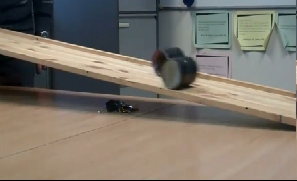1. Video
From Mechanics
(Difference between revisions)
m |
|||
| (One intermediate revision not shown.) | |||
| Line 23: | Line 23: | ||
|- | |- | ||
| [[Image:fig drum2.jpg]] | | [[Image:fig drum2.jpg]] | ||
| - | |valign="top"| | + | |valign="top"| If you are unable to do the drum experiment for yourself, try watching in on the link below. |
http://www.youtube.com/watch?v=O5vvSJjqTOU | http://www.youtube.com/watch?v=O5vvSJjqTOU | ||
| Line 32: | Line 32: | ||
|- | |- | ||
| [[Image:cans1.jpg]] | | [[Image:cans1.jpg]] | ||
| - | |valign="top"| An interesting experiment involves the comparison of the motion of two tin cans when they roll and slide. This is an experiment that you could carry out yourself, | + | |valign="top"| An interesting experiment involves the comparison of the motion of two tin cans when they roll and slide. This is an experiment that you could carry out yourself, or you could watch at the link below. |
http://www.youtube.com/watch?v=Vx6he1pDtes | http://www.youtube.com/watch?v=Vx6he1pDtes | ||
| Line 45: | Line 45: | ||
http://www.youtube.com/watch?v=HGuIFPxuwrU | http://www.youtube.com/watch?v=HGuIFPxuwrU | ||
| - | |- | ||
| - | | [[Image:fig i.GIF]] | ||
| - | |valign="top"| In the first case the resultant force is upwards. As the parachutist is also moving downwards, he slows down. | ||
| - | |||
| - | In the second case the resultant force is zero and the parachutist moves with a constant speed. | ||
| - | |||
| - | |- | ||
| - | | [[Image:fig k.GIF]] | ||
| - | |valign="top"| The resultant force is always downwards. | ||
| - | |||
| - | If the resultant force were zero at the highest point, the ball would stay there!! | ||
| - | |||
| - | |- | ||
| - | | [[Image:fig m.GIF]] | ||
| - | |valign="top"| No, the motion is changing from downwards to upwards. | ||
| - | |||
| - | The resultant force is upwards, for almost all of the time that the ball is in contact with the table. | ||
| - | |||
| - | |- | ||
| - | | [[Image:fig n.GIF]] | ||
| - | |valign="top"| The direction of the motion is always changing, so the forces are not in equilibrium. | ||
| - | |- | ||
| - | | [[Image:fig p.GIF]] | ||
| - | |valign="top"| | ||
| - | |- | ||
| - | | [[Image:fig q.GIF]] | ||
| - | |valign="top"| [[Image:fig r.GIF]] | ||
| - | |- | ||
| - | | [[Image:fig s.GIF]] | ||
| - | |valign="top"| [[Image:fig t.GIF]] | ||
| - | |- | ||
| - | | [[Image:fig u.GIF]] | ||
| - | |valign="top"| [[Image:fig v.GIF]] | ||
|} | |} | ||
Current revision
| Introduction | Video |



